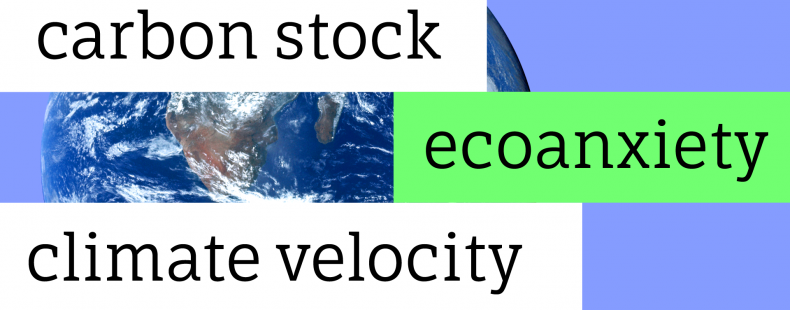Every year on April 22, we celebrate Earth Day and the big blue marble that we all call home. First commemorated in 1970 and now recognized in more than 190 countries, Earth Day is a perfect occasion to think about one of the biggest dangers facing our planet: climate change. As a dictionary, we use this date as an opportunity to document and describe the changing language surrounding climate change—but we should discuss climate change every day of the year, too!
Our first look at climate change explored terms like greenhouse gases, polar vortex, and solastalgia. However, climate change continues to affect our world, and the language around it continuously changes over time. Both the terms we have covered already and the terms we will cover today reflect the vast range of effects climate change can have, from the biological to the psychological. Join us once again as we explore some more words used in the discussion of climate change.
Weather vs. climate
A common discussion centers on the difference between the terms global warming and climate change. We’ve gone down this road before in our other analysis of the terminology, but in summary, the term global warming does not fully encompass all the changes facing the environment. Earth won’t “just” get warmer if the existential threat continues. The term climate change more accurately describes what will really happen: Earth’s entire climate will change dramatically.
Which leads to another common question: what is the difference between weather and climate? People may be confused by freezing winter disasters if Earth’s temperature is gradually rising. If you want to fully understand the difference between weather and climate, we have you covered with our in-depth explanation of the subject. In short, weather describes the short-term atmospheric changes in a small area, while climate refers to the general atmospheric conditions of a large region. This is why even the parts of Brazil with a humid and rainy tropical climate can (rarely) have snowy weather on a given day.
🔑 Key message about language use
As you will soon discover, the term climate change refers to much more than Earth getting warmer. Climate change also refers to changes in the atmosphere, the effects on the Earth’s oceans, and to the fate of all life on Earth—including us!
Glossary of terms
The terms we have collected here should provide you with many informed entry points into the prevalent discussions going on today surrounding climate change.
1.5℃ pathway
The term 1.5℃ pathway refers to a potential future temperature of the Earth, according to the Intergovernmental Panel on Climate Change (IPCC). According to the IPCC, we are projected to exceed a 2°C (3.6°F) rise in global temperatures compared to pre-industrial levels. This may not seem like a big number, but an increase of that amount would have a major effect on our planet (and everything living on it). According to the IPCC, the 1.5°C pathway (2.7°F) represents a less severe (but still bad!) potential future if we manage to keep temperature increases lower.
Anthropocene
Anthropocene is an unofficial term for the epoch of time in which humanity has affected Earth’s climate (anthropo– means “human” and -cene refers to geological periods). The actual official name for our current epoch is Holocene, but some have argued that a new term is needed to refer to significant Earth changes caused by humans.
Pyrocene is another commonly suggested term, as it refers to both humanity’s use of fire (pyro– means “fire”) to change Earth’s climate and the destructive megafires (more on them later) caused by climate change.
anthropogenic
Anthropogenic means “caused or produced by humans.” According to the overwhelming scientific consensus, the alarming rate of climate change we are seeing is anthropogenic.
carbon dioxide and related terms
Carbon dioxide (CO2) is “a colorless, odorless, incombustible gas present in the atmosphere and formed during respiration, usually obtained from coal, coke, or natural gas by combustion, from carbohydrates by fermentation, by reaction of acid with limestone or other carbonates, or naturally from springs.” High levels of carbon dioxide in the atmosphere can have negative consequences, such as intensifying the greenhouse effect that increases Earth’s temperature and shifting Earth’s climate so that extreme weather is more common. The word carbon appears in many terms related to climate change:
- carbon emissions: the amount of carbon dioxide, in general, emitted into the atmosphere by burning fossil fuels or through industry.
- carbon footprint: the amount of carbon dioxide or other carbon compounds emitted into the atmosphere by the activities of an individual, company, country, etc.
- carbon sequestration: the prevention of greenhouse gas build-up in the earth’s atmosphere by methods such as planting trees to absorb carbon dioxide or pumping carbon dioxide into underground reservoirs.
- carbon stock: according to the Food and Agricultural Organization of the United Nations (FAO), a carbon stock is the quantity of carbon in a “pool,” meaning a reservoir or system which has the capacity to accumulate or release carbon. Typically, this term is used to refer to carbon lost due to deforestation.
- carbon tax: a tax on the emissions caused by the burning of coal, gas, and oil, aimed at reducing the production of greenhouse gases.
biodiversity
Biodiversity is diversity among and within plant and animal species in an environment. Climate change has a severe negative effect on biodiversity. Biodiversity is important to maintain a healthy environment (such as in pollination of plants and continuing the nutrient cycle), but we humans depend on biodiversity as well for medicines, food, and the joy we get from seeing flourishing plants and animals.
climate and related terms
Climate plays a huge role in the lives of all living things, including us. Unsurprisingly, the changing climate has produced a slew of new expressions that show the myriad ways climate and climate change affect our lives.
- climate crisis: a term used to show a greater sense of emergency and urgency about climate change. It emphasizes the severity of the threat that climate change poses.
- climate emergency: a term used by the United Nations to stress both the importance of doing something about climate change and the intensity of the consequences if we don’t.
- climate justice: a term used by the United Nations and other organizations, such as the NAACP, that frames climate change as a social and political issue rather than just an environmental one. According to the UN, climate change disproportionately affects those nations where the average income is much lower than in industrial nations and would have a much greater impact on populations in countries in Africa and Asia. These nations have largely rural societies and lack the wealth or resources to make up for the significant absence of food that would occur due to climate change.
- climate overshoot: According to the World Wildlife Fund, a climate overshoot is the period of time in which global temperature exceeds a 1.5°C increase and then cools back down below that amount. A climate overshoot would cause dramatic problems for the environment, such as flooding and wildfires.
- climate strike: a protest motivated by opposition to inaction toward climate change. Climate strikes usually involve young people and have been motivated by climate activists like Greta Thunberg.
- climate velocity: a metric that charts the speed and movement of climates over time. Simply put, this calculation measures movement of animal species out of an area in kilometers due to future climate change. Climate velocity helps guide conservation efforts by showing which specific areas would be most severely impacted by the current rate of climate change.
ecoanxiety
Ecoanxiety is anxiety caused by a dread of environmental perils, especially climate change, and a feeling of helplessness over the potential consequences for those living now and even more so for later generations. Ecoanxiety was just one of the many new terms we recently added to our dictionary.
ecolinguistics
Ecolinguistics is a general term for a field of research that studies the effect of language on the environment and the effect of the environment on language. This field of research investigates issues such as the loss of languages due to people being made climate refugees by climate change.
extreme weather events
Extreme weather event is a broad term used to refer to an instance of severe weather with a high potential to cause death and destruction. Climate change is responsible for many extreme weather events, for example: a wildfire, bombogenesis, polar vortex, and derecho.
EV (electric vehicle)
EV is a common abbreviation for electric vehicle. Motivated in part by concerns of climate change, the number of EVs on the road has increased dramatically in the past decade from under 20,000 EVs worldwide in 2010 to nearly 7.2 million in 2019.
megadrought
While there is no official definition, a megadrought is considered in the United States to be a drought that lasts at least more than 20 years. Mega- is a combining form used as a prefix to mean “large” or “great.”In early 2021, the southwestern United States experienced a severe megadrought that scientists said was the first to be caused by human-induced climate change. This 23-year megadrought is the worst in 1200 years.
megafire
According to the United States Department of Agriculture, a megafire is a wildfire that burns over 100,000 acres. Megafires used to be relatively rare, but they have become exponentially more common largely due to wildfires caused by climate change. The state of California in particular has suffered from many megafires over the past several years with a 2020 wildfire burning over 1 million acres for the first time in state history.
mitigation
Mitigation is the act of mitigating, or lessening the force or intensity of something unpleasant, as wrath, pain, grief, or extreme circumstances. Many government agencies and scientific organizations, such as NASA, are trying to research ways to mitigate climate change by reducing carbon emissions.
GWP (Global Warming Potential)
According to the EPA, Global Warming Potential is a measure of the total energy that a gas absorbs over a particular period of time (usually 100 years), compared to carbon dioxide. According to the EPA, this measurement was developed in order to compare the impact of different greenhouse gases on climate change.
mass extinction event
A mass extinction event, or mass extinction, is the extinction of a large number of species within a relatively short period of geological time, thought to be due to factors such as a catastrophic global event or widespread environmental change that occurs too rapidly for most species to adapt. Modern scientific reporting suggests that climate change could directly lead to a future mass extinction event. According to the fossil record, there have been at least five mass extinctions in Earth’s history:
- The Ordovician-silurian Extinction (440 million years ago)
- The Devonian Extinction (365 million years ago)
- The Permian-triassic Extinction (250 million years ago)
- The Triassic-jurassic Extinction (210 million years ago): Recent scientific studies suggest that climate change may have contributed to this mass extinction.
- The Cretaceous-tertiary Extinction (65 Million Years Ago): the mass extinction during which the dinosaurs died.
Paris Agreement
The Paris Agreement, sometimes called “the Paris accord” by the media, is a 2016 international treaty focused on combating climate change. The Paris Agreement set the goal to limit the global temperature increase to 1.5° Celsius—remember the 1.5℃ pathway from earlier?—by allowing countries to provide each other with financial and technological support. The United States withdrew from the agreement in 2020 during the presidency of Donald Trump but rejoined it on January 20, 2021 immediately after the inauguration of President Joe Biden.
sea-level rise
The term sea-level rise, or its variants such as relative sea-level rise or global sea-level rise, might be more familiar to you than the other terms on this list, but you may not know exactly what it means.
The sea level is the horizontal plane or level corresponding to the surface of the sea at mean level between high and low tide. Sea-level rise refers to the steadily increasing sea levels that scientists are recording on a global scale. Because it is on this list, you shouldn’t be surprised to learn that scientists trace sea-level rise to climate change through melting ice sheets and thermal expansion.
What is thermal expansion? As water warms, it expands and spreads out. When Earth’s oceans experience thermal expansion, they expand and take up more space, which causes the sea level to rise. It is very likely that sea-level rise could cause extensive damage and destruction to coastal cities and infrastructure.














